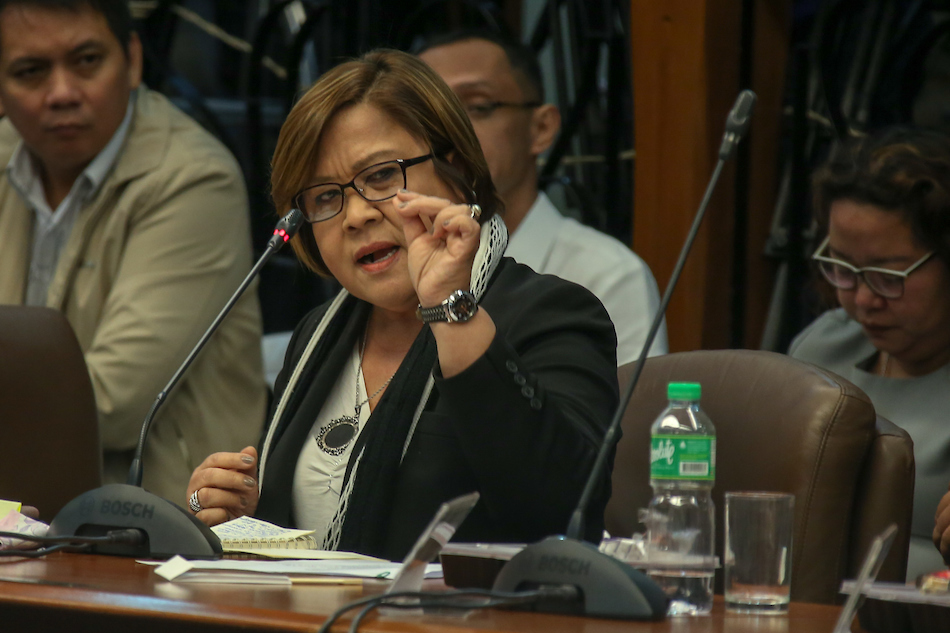Palace denies De Lima drug cases are 'politically motivated' | ABS-CBN
ADVERTISEMENT

Welcome, Kapamilya! We use cookies to improve your browsing experience. Continuing to use this site means you agree to our use of cookies. Tell me more!
Palace denies De Lima drug cases are 'politically motivated'
Palace denies De Lima drug cases are 'politically motivated'
ABS-CBN News
Published Feb 20, 2017 02:15 PM PHT
MANILA - Malacañang on Monday denied accusations of an international human rights group that the drug cases against Senator Leila de Lima are politically motivated, insisting that these are “criminal in nature.”
MANILA - Malacañang on Monday denied accusations of an international human rights group that the drug cases against Senator Leila de Lima are politically motivated, insisting that these are “criminal in nature.”
Presidential Spokesperson Ernesto Abella said the group Human Rights Watch (HRW) disregards the rights of the Philippines as a nation that must be protected against illegal drugs by calling on "foreign governments to step up to denounce the Duterte administration" for alleged human rights violations.
Presidential Spokesperson Ernesto Abella said the group Human Rights Watch (HRW) disregards the rights of the Philippines as a nation that must be protected against illegal drugs by calling on "foreign governments to step up to denounce the Duterte administration" for alleged human rights violations.
“It banally disregards the right of a nation to protect its citizens against the menace of a global drug industry, and terrorist-connected drug trade; and that it has done so with assumption of regularity,” Abella said in a statement.
“It banally disregards the right of a nation to protect its citizens against the menace of a global drug industry, and terrorist-connected drug trade; and that it has done so with assumption of regularity,” Abella said in a statement.
The HRW on Sunday said the Duterte administration is abusing the judicial system to punish critics of its drug war, such as the drug cases filed against De Lima, who once initiated a Senate inquiry into the President's bloody campaign against illegal drugs.
The HRW on Sunday said the Duterte administration is abusing the judicial system to punish critics of its drug war, such as the drug cases filed against De Lima, who once initiated a Senate inquiry into the President's bloody campaign against illegal drugs.
ADVERTISEMENT
"The prosecution of Senator Leila de Lima is an act of political vindictiveness that debases the rule of law in the Philippines,” said Phelim Kine, HRW deputy Asia director.
"The prosecution of Senator Leila de Lima is an act of political vindictiveness that debases the rule of law in the Philippines,” said Phelim Kine, HRW deputy Asia director.
The group also noted that attacks against De Lima intensified after a witness, self-professed hitman Edgar Matobato, accused the President of ordering assassinations when he was still Davao mayor.
The group also noted that attacks against De Lima intensified after a witness, self-professed hitman Edgar Matobato, accused the President of ordering assassinations when he was still Davao mayor.
The Department of Justice last Friday filed three drug trafficking cases against De Lima for which bail may be denied.
The Department of Justice last Friday filed three drug trafficking cases against De Lima for which bail may be denied.
“De Lima's case is not politically motivated. It is, simply put, 'criminal in nature.' The human rights organization might bear that in mind before it attempts to obligate the Duterte administration,” Abella said.
“De Lima's case is not politically motivated. It is, simply put, 'criminal in nature.' The human rights organization might bear that in mind before it attempts to obligate the Duterte administration,” Abella said.
Abella added that the HRW broadly paints the "killings of thousands of alleged drug uses and drug dealers after Duterte took office on June 30" - without identifying what deaths belonged to police operations, deaths not related to drugs and extrajudicial killings.
Abella added that the HRW broadly paints the "killings of thousands of alleged drug uses and drug dealers after Duterte took office on June 30" - without identifying what deaths belonged to police operations, deaths not related to drugs and extrajudicial killings.
“Human Rights Watch blithely ignores the approximately 1,000,000 users and dealers who turned themselves in, the discovery of industrial size illegal drug factories, and the unimaginable extent that 'narco-politics' has gripped local politics, law-enforcement and to some extent the legislative and judicial departments,” Abella said.
“Human Rights Watch blithely ignores the approximately 1,000,000 users and dealers who turned themselves in, the discovery of industrial size illegal drug factories, and the unimaginable extent that 'narco-politics' has gripped local politics, law-enforcement and to some extent the legislative and judicial departments,” Abella said.
If found guilty, De Lima faces between 12 years to life in prison. Under the law, legislators only enjoy privilege from arrest for crimes punishable by less than 6 years imprisonment.
If found guilty, De Lima faces between 12 years to life in prison. Under the law, legislators only enjoy privilege from arrest for crimes punishable by less than 6 years imprisonment.
ADVERTISEMENT
ADVERTISEMENT



